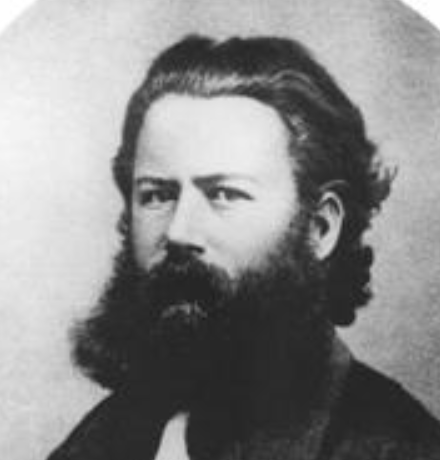Ghost at The George Street Playhouse
By Sue Weston and Susan Rosenbluth, Two Sues on the Aisle
Women writers have begun to take their rightful place in the literary world. In previous generations, they would have written under a pen name. This is the premise for ‘Ibsen’s Ghost – An Irresponsible Biographical Fantasy’ by actor/playwright Charles Busch. Busch writes about Suzannah, the wife of legend Henrik Johan Ibsen who sacrificed her career to become the ‘woman behind the great man’ we saw it performed at The George Street Playhouse in January 2024.
Why Ibsen?
 Henrik Johan Ibsen, born 1828, was a Norwegian playwright dubbed “the father of realism” and one of the founders of modernism in theatre. He modeled his characters after family members. His wife Suzannah was Mrs. Alving from Ghosts and Nora from A Doll’s House.
Henrik Johan Ibsen, born 1828, was a Norwegian playwright dubbed “the father of realism” and one of the founders of modernism in theatre. He modeled his characters after family members. His wife Suzannah was Mrs. Alving from Ghosts and Nora from A Doll’s House.
Ibsen’s plays are social commentaries that explore the role of women with complex female characters trapped in unhappy situations. What if, these stories were pulled not from Ibsen’s imagination at all?
Factual Foundation
Ibsen’s Ghost – An Irresponsible Biographical Fantasy incorporates some factual elements, an illegitimate son, his marriage to Suzannah Thoresen, and their son Sigurd who went into politics, along with a self-imposed exile from Norway. Any similarity to reality ends by setting the play after Ibsen’s passing. As Norway recognized Ibsen after his death, the women in Ibsen’s life explored ways to benefit financially.
Our Impression
This production was a parody of Ghosts dealing (in a playful way) with the power of ingrained moral contamination to undermine idealism. Busch creates a character, who can detect infestation and exorcize it. She rids Ibsen’s house of ghosts, frees the servant girl from her deformity, and empowers the women to collaboratively write Ibsen’s diary and share the profits.
These strong and accomplished women defy the societal stereotypes as the frailer sex prone to hysteria, it gives them a voice as individuals. Sex is a secondary theme in the play, paralleling Ibsen’s plays but with a different point of view. In Ibsen’s Ghost women are not objects of affection who are impacted by scandalous behaviors, instead, they are complicit partners.
Ibsen’s Ghost introduces a mysterious author who turns out to be one of Ibsen’s women mentees (she claims that she was the inspiration for Ibsen’s Nora). She was Suzannah’s closest friend and her sole confidant. This makes us question if Ibsen’s writing, could have been in part his wife’s. Especially when we consider Suzannah’s frequent claims that she ‘forced the pen into his hand at times.’ She wrote his correspondence, and was appointed to write the new version of ‘diary.’ Is Busch suggesting that these strong women played a larger role in the literary world?
Busch commented ‘I hope the audience won’t think we’re doing a revival of Ibsen’s ‘Ghosts.’’ After attending the performance, there was no confusion. ‘Ibsen’s Ghost – An Irresponsible Biographical Fantasy’ is a fictionalized, extrapolation of what if’s imagining how much influence Suzannah had in the creative process and the role women played in literature while keeping their gender, and names hidden.
Now Playing – The Club
Step back into a perfectly recreated upscale suburban living room on a Sunday in October 1968. The room is strewn with bottles and glasses remaining from an evening of excessive drinking with friends. Couples escaped to the suburbs to find a community to raise their families but discovered prejudice existed amid their landscaped lawns and beautiful homes. In his play, The Club, bestselling novelist Chris Bohjalian depicts the 1960s lifestyle filled with opulence, and friendly neighbors who struggle to try to balance cultural inclusion. On the surface, The Club exposes racism, yet the message cuts deeper, exploring the courage to speak out and the meaning of true friendship.
The Plot
The 1960s was a period for hippy-vibrant colors, short skirts, flirty marital infidelity, and a push for upward mobility. Making the right connections was important. Young families moved to the suburbs and created communities with activities centered around belonging to The Club.
The show begins with Richard and Anna Barrows bickering about their behavior the night before as their 13-year-old daughter, Olive, observes their childish behavior. Typical Sunday mornings at the Barrows involved hangovers and tennis at The Club. But this Sunday’s discordant behavior is about inappropriate relationships with friends, blamed on the alcohol and Anna’s discovery that their friends, Peter and Anna Kendricks, would be denied admittance to The Club because they are black. We learn that the problem is a deeper societal issue than the Membership Committee voting no.
Written by Chris Bohjalian, and directed by David Saint, The Club will run through Mach 17
George Street Playhouse – Theater at its Best
For the past 50 years, The George Street Playhouse has brought groundbreaking and inspiring productions ranging from new works to the classics. Ibsen’s Ghost and The Club are examples of their unwavering commitment to bringing new works to the stage in New Jersey.
The George Street Playhouse was founded by Eric Krebs in 1974, located in an abandoned supermarket on the corner of George and Albany Streets. It brought professional theatre to New Brunswick. In the 2019 season, they moved to their new location in The New Brunswick Performing Arts Center in downtown New Brunswick.
Performances at The George Street Playhouse are limited runs. We suggest you watch their calendar of events and jump on the opportunity to watch some amazing performances in New Jersey.









